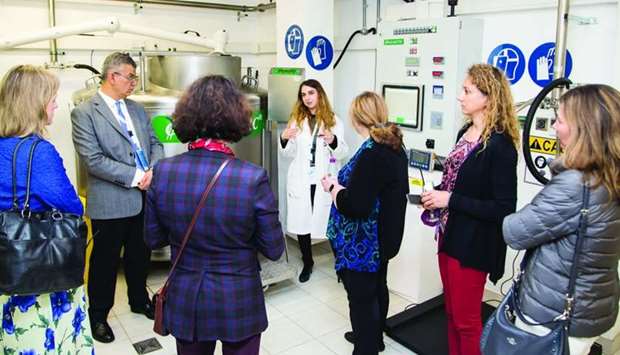Leading scientists and experts who attended the International Biobanking Conference 2019, visited Qatar Biobank and its facilities recently.
The best practices implemented at Qatar Biobank - a member of Qatar Foundation, and part of Qatar Foundation Research, Development, and Innovation - were highlighted to conference delegates during their tour of the state-of-the-art facilities where biological samples collected from the population are stored and analysed.
The quality and safety of the samples is maintained at Qatar Biobank by using the most reliable automated storage systems and procedures including sample tracking, liquid nitrogen storage, and duplicate storage sites.
Dr Richard O’Kennedy, vice president for Research, Development, and Innovation, Qatar Foundation, said, “It is platforms like this conference that provide the impetus for local and international experts in the field to converge and initiate the ground-work for addressing our common challenges through a focused agenda. Qatar Biobank and Qatar Genome Programme, will continue to deliver excellence through high-quality, innovative health and biomedical research in Qatar.”
Dr Zhengming Chen, lead principal investigator at China Kadoorie Biobank, commented, “Qatar Biobank has been one of the major recent developments in ‘big biobanks’ in the last 10 years. This is an exciting era in medical research and technology. These kinds of bigger studies allow for more reliable assessment of risks for a spectrum of diseases.”
“The model used by Qatar Biobank is an excellent example of how science and technology continue to lead innovation and how we can use the latest technology for sample processing,” noted Dr Andrew Brooks, chief operating officer and director of technology development of RUCDR Infinite Biologics at Rutgers University, New Jersey.
During the three-day conference, held under the theme ‘Quality Matters: A Global Discussion in Qatar’, the value of collaboration was also highlighted by representatives from international biobank networks.
Speakers shared best practices from across the world, including from the Leipzig Medical Biobank in Germany, Helsinki Biobank in Finland, China Kadoorie Biobank, Biobank in Austria, and Qatar Biobank.
Dr Asmaa al-Thani, board vice chairperson of Qatar Biobank and chairperson of Qatar Genome Programme Committee, said, “Qatar Biobank strives to build partnerships across the spectrum, bringing together and coordinating the work of scientists as well as clinicians, laboratories, epidemiologists, academic institutions, regulators, and funding institutions – and also our patients.”
"International collaboration gives biomedical researchers access to larger biobanks, which is essential to the study of cancer and other chronic diseases, and for comparing lifestyle and clinical information to identify the causes and enhance the prediction of such diseases,” added Dr Roberto Bertollini, adviser to Qatar’s minister of public health.
The quality and safety of the samples is maintained at Qatar Biobank by using the most reliable automated storage systems and procedures including sample tracking, liquid nitrogen storage, and duplicate storage sites.
Dr Richard O’Kennedy, vice president for Research, Development, and Innovation, Qatar Foundation, said, “It is platforms like this conference that provide the impetus for local and international experts in the field to converge and initiate the ground-work for addressing our common challenges through a focused agenda. Qatar Biobank and Qatar Genome Programme, will continue to deliver excellence through high-quality, innovative health and biomedical research in Qatar.”
Dr Zhengming Chen, lead principal investigator at China Kadoorie Biobank, commented, “Qatar Biobank has been one of the major recent developments in ‘big biobanks’ in the last 10 years. This is an exciting era in medical research and technology. These kinds of bigger studies allow for more reliable assessment of risks for a spectrum of diseases.”
“The model used by Qatar Biobank is an excellent example of how science and technology continue to lead innovation and how we can use the latest technology for sample processing,” noted Dr Andrew Brooks, chief operating officer and director of technology development of RUCDR Infinite Biologics at Rutgers University, New Jersey.
During the three-day conference, held under the theme ‘Quality Matters: A Global Discussion in Qatar’, the value of collaboration was also highlighted by representatives from international biobank networks.
Speakers shared best practices from across the world, including from the Leipzig Medical Biobank in Germany, Helsinki Biobank in Finland, China Kadoorie Biobank, Biobank in Austria, and Qatar Biobank.
Dr Asmaa al-Thani, board vice chairperson of Qatar Biobank and chairperson of Qatar Genome Programme Committee, said, “Qatar Biobank strives to build partnerships across the spectrum, bringing together and coordinating the work of scientists as well as clinicians, laboratories, epidemiologists, academic institutions, regulators, and funding institutions – and also our patients.”
"International collaboration gives biomedical researchers access to larger biobanks, which is essential to the study of cancer and other chronic diseases, and for comparing lifestyle and clinical information to identify the causes and enhance the prediction of such diseases,” added Dr Roberto Bertollini, adviser to Qatar’s minister of public health.

